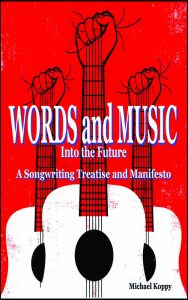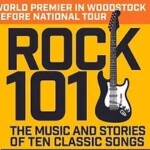 In Words and Music Into the Future: a Songwriting Treatise and Manifesto, songwriter Michael Koppy states what you may have thought but never dared to say, or perhaps what you have intuited but never found the ever-so-eloquent words to express, until now: he challenges the emperors of songwriting.
In Words and Music Into the Future: a Songwriting Treatise and Manifesto, songwriter Michael Koppy states what you may have thought but never dared to say, or perhaps what you have intuited but never found the ever-so-eloquent words to express, until now: he challenges the emperors of songwriting.
Maybe you’ve noticed popular musical acts so rich in flair that their lyrics play second fiddle to the point of communicating nothing meaningful at all. Maybe you’ve had a nagging suspicion that some songs are merely jumbles of emotionally salient words pieced together at the last minute, like musical Rorschach inkblot tests. Or that said musical inkblots are elevated as divine acts of creative brilliance by fawning critics who have generously imbued them with meaning. Or that maybe you have been fleeced by a songwriting industry spinning sloppily written lyrics into fool’s gold. If you hold suspicions such as these, Words and Music Into the Future will assure you: Yes, you are right. And no, you are not alone. The impresario indeed has no clothes.
Words and Music Into the Future opens on a high note, sustained throughout Koppy’s treatise. In the opening chapter “No, Don, the Levee Wasn’t Dry – And No One Was Drinking Whiskey and Rye,” Koppy tears asunder none other than that most universally revered song by Don McLean, “American Pie.” The author begins by laying its lyrics bare on the page for all readers to see, stripped of the magic of their musicality:
“Bye, bye Miss American Pie.
Drove my Chevy to the levee but the levee was dry.
Them good ole boys were drinking whiskey and rye,
Singin’ this’ll be the day that I die;”
Koppy then invites readers to take an honest look at the lyrics as he proceeds to ravage this most treasured anthem mercilessly, dissecting it line by line and word for word:
“Rye is a kind of whiskey – so ‘drinking whiskey and rye’ is roughly equivalent to ‘eating eggs and egg yolks’ or ‘watching television and a television show’; a stumbling redundancy”….“The fumbling ‘dry levee’ in McLean’s effort adds nothing meritorious. One can assert it holds deeper relevance and resonance, of course—hell, one can assert anything—but such an assertion is really quite lacking in support…“’This’ll be the day that I die’—the capper to it all—is wholly unpossessed of adjacent coherent setup. So, basically over-inflated and lugubrious, it just hangs there, bereft of the obviously intended gravitas.”
Koppy then continues by revealing the gymnastic ways critics have contorted their song interpretations to credit the work with more meaning (and merit) than is evident, then tears apart these interpretations with similarly savage rebukes.
Throughout, Koppy picks apart 30 additional songs with remarkable force and precision, including seven that he presents as strong songwriting, and some that receive mixed feedback. his observations are so detailed and accurate that one can’t help but wonder “Why have I never noticed this before?” or agreement with a criticism that is brutal beyond belief.
Whenever he is not taking apart individual songs, he is tearing apart the entire music industry. From artists admitting to laziness in craft to fawning critics who pay tribute to bumbling mediocrity, from the yawning pomposity of award shows to the untold story of widespread behind-the-scenes plagiarism, no person or practice is spared.
Perhaps the most striking feature of Words and Music Into the Future is Koppy’s voice. Part Christopher Hitchens, part Denis Leary, the writing combines the intellectual precision of an academic with the raw candor of an insult comic, delivered with an abundance of wild and wonderful words, and clever phrases such as “Intellectual bantamweights like [Dylan biographer Christopher] Ricks—like other occasional high voltage / low wattage characters prominent here and there around the world—can sometimes build impressive careers.”
Of course, clever words alone do not make great writing. Erudite yet unpretentious, Koppy leverages his masterful vocabulary as an intellectual heavyweight, striking with maximum force and precision.
Though the vast majority of the book criticizes mediocre songwriting and an industry that condones it, the end of the manifesto offers observations on verse structure, references to positive examples of songwriting, and guidance on the philosophy and work ethic of strong songwriting. Amid much criticism, one positive chord that Koppy strikes repeatedly is stressing the central importance of words in music, elevating meaning and message over all other aspects, especially melody: “If music—especially melody—is the most important component in a song, with lyrics being secondary, why aren’t we all merrily strolling down the street belting out advertising jingles?”
Perhaps the most thoughtful expression of Koppy’s guiding philosophy can be found in his chapter “On Brightly Wrapped Packages”: “As put quite simply by storied lyricist Yip Harburg [“April in Paris,” “It’s Only a Paper Moon” and the score for The Wizard of Oz, including “Over the Rainbow”] ‘Music makes you feel. Words make you think. A song makes you feel a thought.’ But a casual inversion of that dictum — so ‘A song makes you think a feeling’—doesn’t quite correspond.”
Readers with an emotional attachment to Bob Dylan may want to steer clear of Words and Music Into the Future, as the author’s attacks on Dylan are uniquely savage. Everyone else should find a combination of delight and insight in Michael Koppy’s tour-de-force, which is nothing short of an insurrection against the tepid status quo of popular songwriting, calling out what many of us have intuited but never dared to say: the impresario truly has no clothes.
— Rolf Hendriks
Rolf Hendriks is a software engineer with a passion for creative writing.







Be the first to comment!